Everest Simulation: A Reflective Analysis of Leadership and Teamwork
VerifiedAdded on 2023/06/04
|10
|2320
|106
Essay
AI Summary
This essay provides a comprehensive reflection on the author's leadership experiences during an Everest simulation. It begins with a background on the author's leadership development through family business and academic experiences, highlighting the influence of leaders like Abraham Lincoln. The essay delves into the dynamics of a diverse team of 11 members, emphasizing the challenges and benefits of cultural and personality differences. It explores the interplay between leadership and follower-ship, noting the adoption of transformational leadership skills. Positive aspects of the experience include enhanced skills, increased confidence, and effective communication, while negative aspects involve instances of ignored guidance and lack of responsibility. The essay concludes with a detailed development plan focusing on leadership, communication, and decision-making skills, with specific timelines and methods for improvement. Desklib offers a wide array of study tools and resources to aid students in their academic pursuits, including past papers and solved assignments.
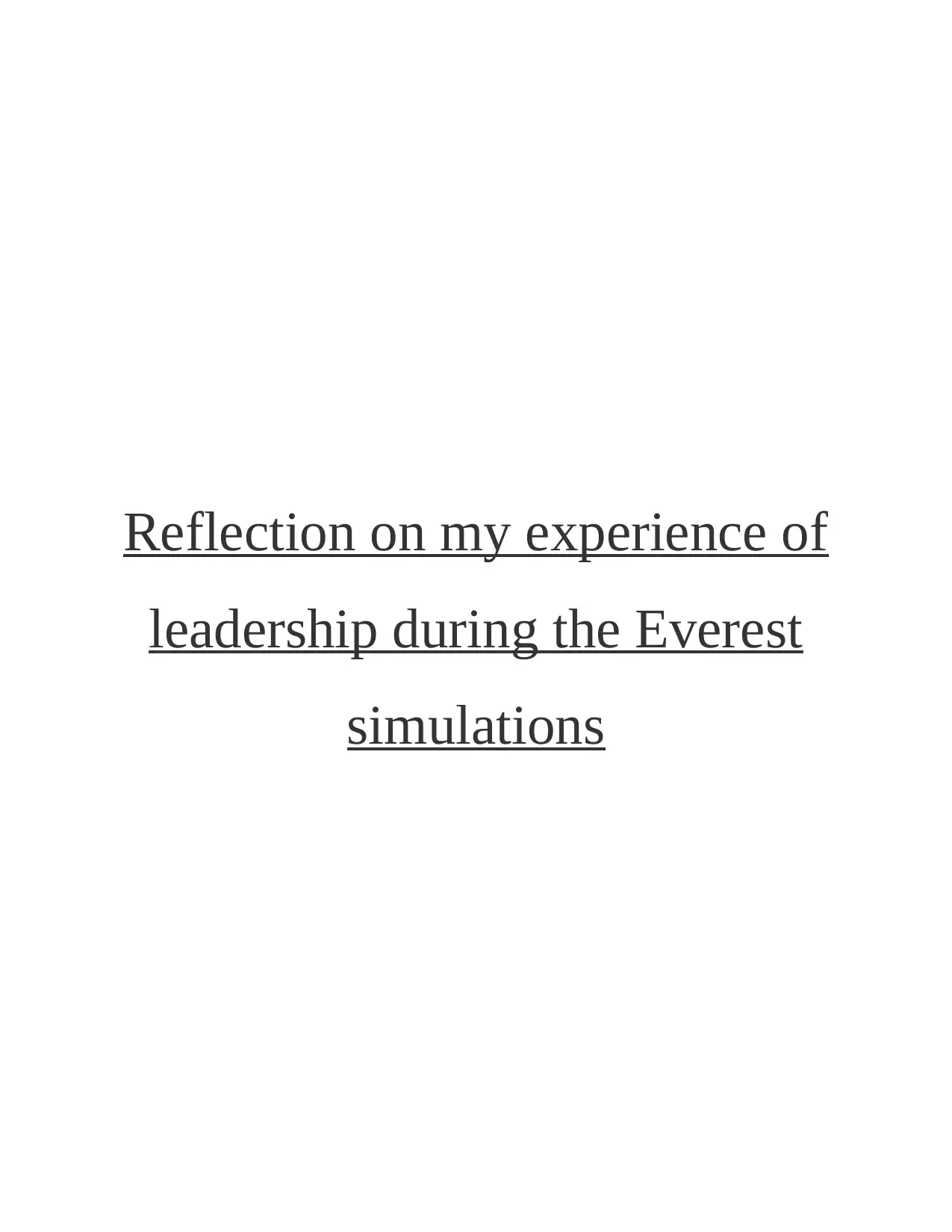
Reflection on my experience of
leadership during the Everest
simulations
leadership during the Everest
simulations
Paraphrase This Document
Need a fresh take? Get an instant paraphrase of this document with our AI Paraphraser
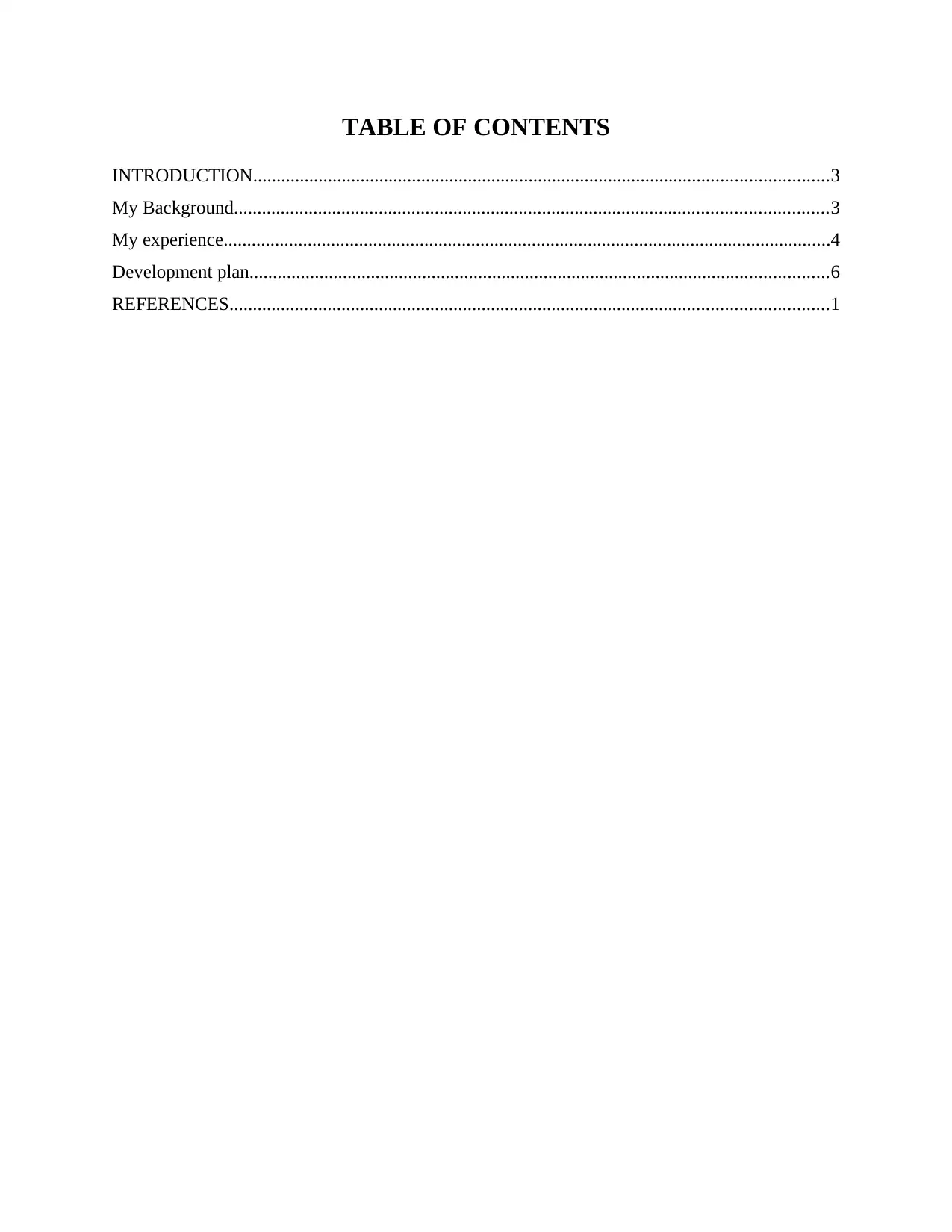
TABLE OF CONTENTS
INTRODUCTION...........................................................................................................................3
My Background...............................................................................................................................3
My experience..................................................................................................................................4
Development plan............................................................................................................................6
REFERENCES................................................................................................................................1
INTRODUCTION...........................................................................................................................3
My Background...............................................................................................................................3
My experience..................................................................................................................................4
Development plan............................................................................................................................6
REFERENCES................................................................................................................................1
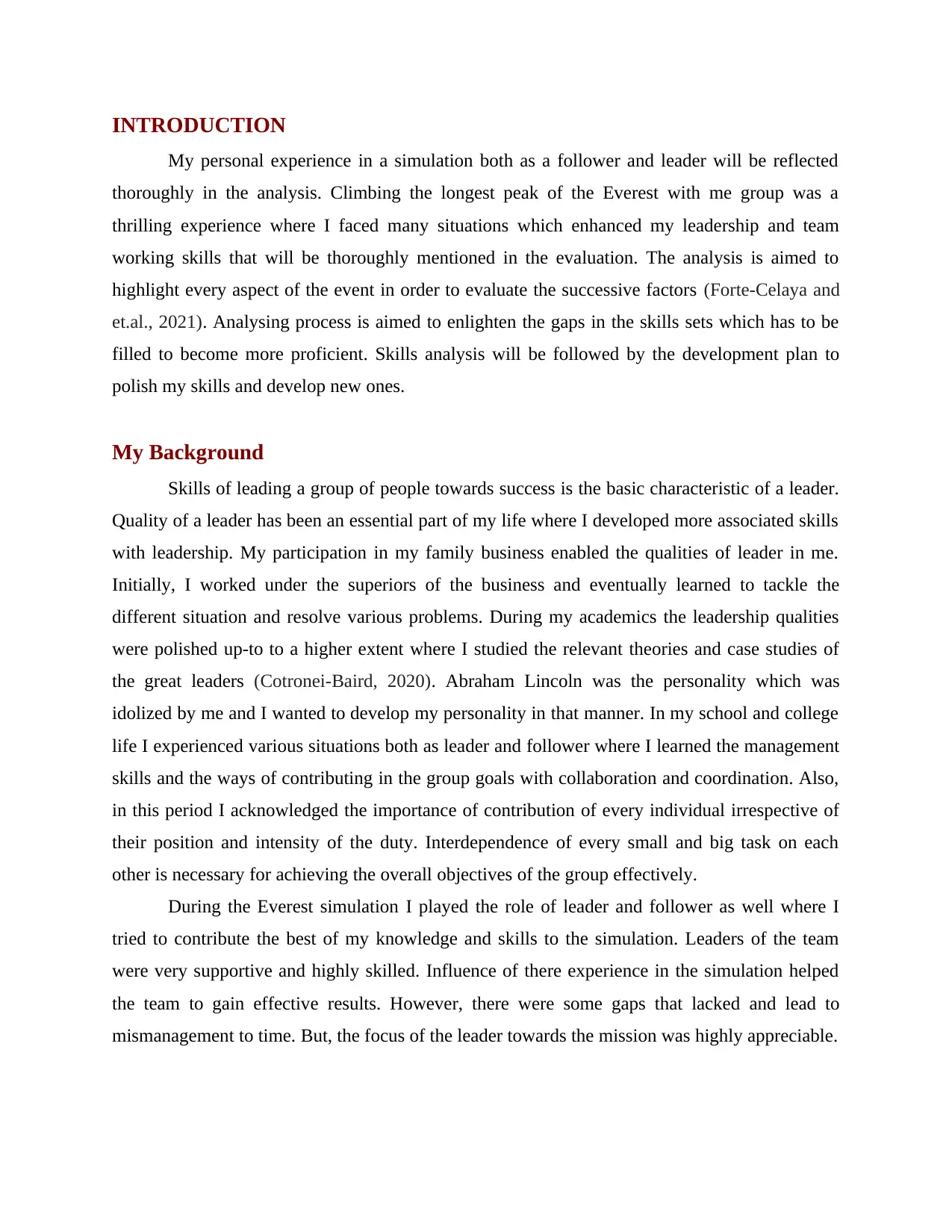
INTRODUCTION
My personal experience in a simulation both as a follower and leader will be reflected
thoroughly in the analysis. Climbing the longest peak of the Everest with me group was a
thrilling experience where I faced many situations which enhanced my leadership and team
working skills that will be thoroughly mentioned in the evaluation. The analysis is aimed to
highlight every aspect of the event in order to evaluate the successive factors (Forte-Celaya and
et.al., 2021). Analysing process is aimed to enlighten the gaps in the skills sets which has to be
filled to become more proficient. Skills analysis will be followed by the development plan to
polish my skills and develop new ones.
My Background
Skills of leading a group of people towards success is the basic characteristic of a leader.
Quality of a leader has been an essential part of my life where I developed more associated skills
with leadership. My participation in my family business enabled the qualities of leader in me.
Initially, I worked under the superiors of the business and eventually learned to tackle the
different situation and resolve various problems. During my academics the leadership qualities
were polished up-to to a higher extent where I studied the relevant theories and case studies of
the great leaders (Cotronei-Baird, 2020). Abraham Lincoln was the personality which was
idolized by me and I wanted to develop my personality in that manner. In my school and college
life I experienced various situations both as leader and follower where I learned the management
skills and the ways of contributing in the group goals with collaboration and coordination. Also,
in this period I acknowledged the importance of contribution of every individual irrespective of
their position and intensity of the duty. Interdependence of every small and big task on each
other is necessary for achieving the overall objectives of the group effectively.
During the Everest simulation I played the role of leader and follower as well where I
tried to contribute the best of my knowledge and skills to the simulation. Leaders of the team
were very supportive and highly skilled. Influence of there experience in the simulation helped
the team to gain effective results. However, there were some gaps that lacked and lead to
mismanagement to time. But, the focus of the leader towards the mission was highly appreciable.
My personal experience in a simulation both as a follower and leader will be reflected
thoroughly in the analysis. Climbing the longest peak of the Everest with me group was a
thrilling experience where I faced many situations which enhanced my leadership and team
working skills that will be thoroughly mentioned in the evaluation. The analysis is aimed to
highlight every aspect of the event in order to evaluate the successive factors (Forte-Celaya and
et.al., 2021). Analysing process is aimed to enlighten the gaps in the skills sets which has to be
filled to become more proficient. Skills analysis will be followed by the development plan to
polish my skills and develop new ones.
My Background
Skills of leading a group of people towards success is the basic characteristic of a leader.
Quality of a leader has been an essential part of my life where I developed more associated skills
with leadership. My participation in my family business enabled the qualities of leader in me.
Initially, I worked under the superiors of the business and eventually learned to tackle the
different situation and resolve various problems. During my academics the leadership qualities
were polished up-to to a higher extent where I studied the relevant theories and case studies of
the great leaders (Cotronei-Baird, 2020). Abraham Lincoln was the personality which was
idolized by me and I wanted to develop my personality in that manner. In my school and college
life I experienced various situations both as leader and follower where I learned the management
skills and the ways of contributing in the group goals with collaboration and coordination. Also,
in this period I acknowledged the importance of contribution of every individual irrespective of
their position and intensity of the duty. Interdependence of every small and big task on each
other is necessary for achieving the overall objectives of the group effectively.
During the Everest simulation I played the role of leader and follower as well where I
tried to contribute the best of my knowledge and skills to the simulation. Leaders of the team
were very supportive and highly skilled. Influence of there experience in the simulation helped
the team to gain effective results. However, there were some gaps that lacked and lead to
mismanagement to time. But, the focus of the leader towards the mission was highly appreciable.
⊘ This is a preview!⊘
Do you want full access?
Subscribe today to unlock all pages.

Trusted by 1+ million students worldwide
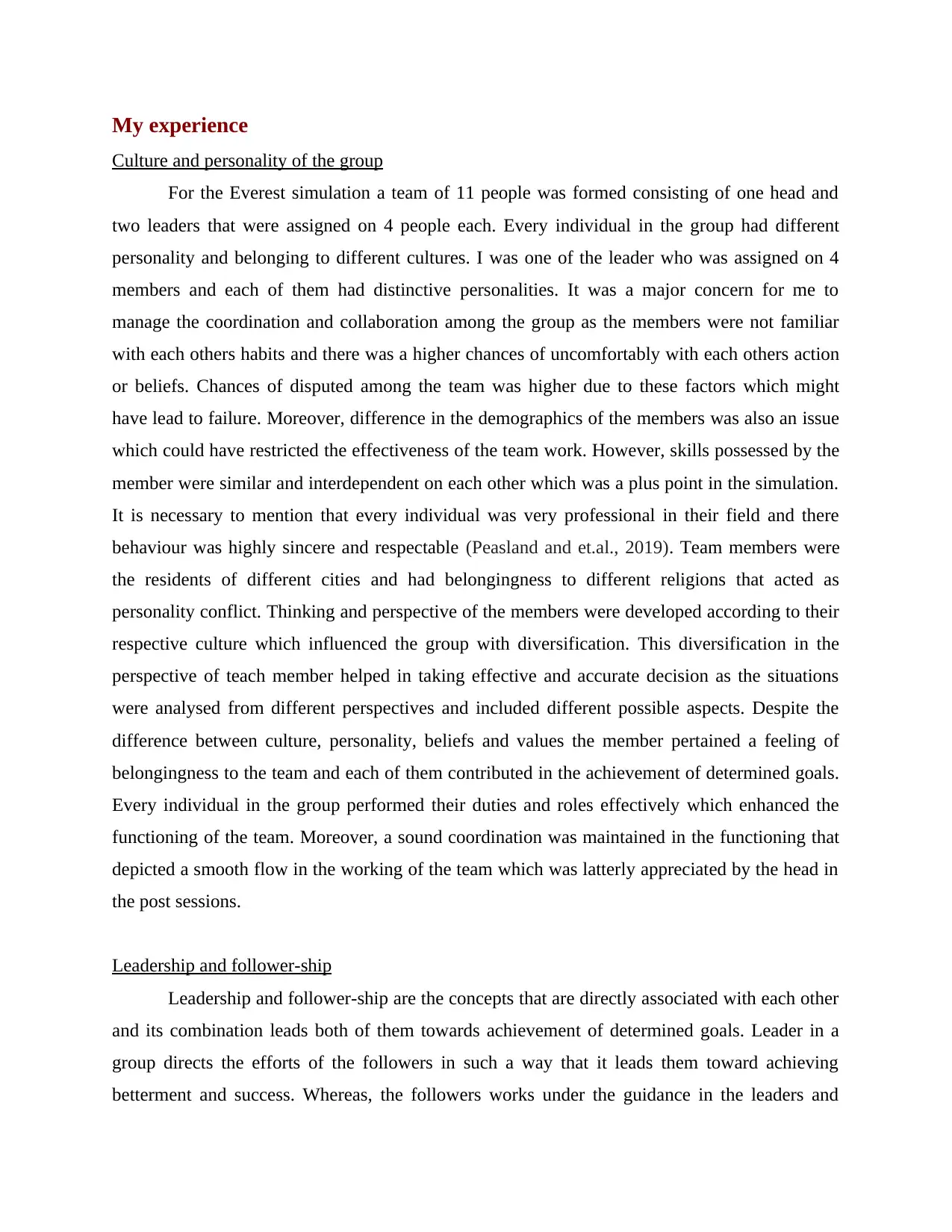
My experience
Culture and personality of the group
For the Everest simulation a team of 11 people was formed consisting of one head and
two leaders that were assigned on 4 people each. Every individual in the group had different
personality and belonging to different cultures. I was one of the leader who was assigned on 4
members and each of them had distinctive personalities. It was a major concern for me to
manage the coordination and collaboration among the group as the members were not familiar
with each others habits and there was a higher chances of uncomfortably with each others action
or beliefs. Chances of disputed among the team was higher due to these factors which might
have lead to failure. Moreover, difference in the demographics of the members was also an issue
which could have restricted the effectiveness of the team work. However, skills possessed by the
member were similar and interdependent on each other which was a plus point in the simulation.
It is necessary to mention that every individual was very professional in their field and there
behaviour was highly sincere and respectable (Peasland and et.al., 2019). Team members were
the residents of different cities and had belongingness to different religions that acted as
personality conflict. Thinking and perspective of the members were developed according to their
respective culture which influenced the group with diversification. This diversification in the
perspective of teach member helped in taking effective and accurate decision as the situations
were analysed from different perspectives and included different possible aspects. Despite the
difference between culture, personality, beliefs and values the member pertained a feeling of
belongingness to the team and each of them contributed in the achievement of determined goals.
Every individual in the group performed their duties and roles effectively which enhanced the
functioning of the team. Moreover, a sound coordination was maintained in the functioning that
depicted a smooth flow in the working of the team which was latterly appreciated by the head in
the post sessions.
Leadership and follower-ship
Leadership and follower-ship are the concepts that are directly associated with each other
and its combination leads both of them towards achievement of determined goals. Leader in a
group directs the efforts of the followers in such a way that it leads them toward achieving
betterment and success. Whereas, the followers works under the guidance in the leaders and
Culture and personality of the group
For the Everest simulation a team of 11 people was formed consisting of one head and
two leaders that were assigned on 4 people each. Every individual in the group had different
personality and belonging to different cultures. I was one of the leader who was assigned on 4
members and each of them had distinctive personalities. It was a major concern for me to
manage the coordination and collaboration among the group as the members were not familiar
with each others habits and there was a higher chances of uncomfortably with each others action
or beliefs. Chances of disputed among the team was higher due to these factors which might
have lead to failure. Moreover, difference in the demographics of the members was also an issue
which could have restricted the effectiveness of the team work. However, skills possessed by the
member were similar and interdependent on each other which was a plus point in the simulation.
It is necessary to mention that every individual was very professional in their field and there
behaviour was highly sincere and respectable (Peasland and et.al., 2019). Team members were
the residents of different cities and had belongingness to different religions that acted as
personality conflict. Thinking and perspective of the members were developed according to their
respective culture which influenced the group with diversification. This diversification in the
perspective of teach member helped in taking effective and accurate decision as the situations
were analysed from different perspectives and included different possible aspects. Despite the
difference between culture, personality, beliefs and values the member pertained a feeling of
belongingness to the team and each of them contributed in the achievement of determined goals.
Every individual in the group performed their duties and roles effectively which enhanced the
functioning of the team. Moreover, a sound coordination was maintained in the functioning that
depicted a smooth flow in the working of the team which was latterly appreciated by the head in
the post sessions.
Leadership and follower-ship
Leadership and follower-ship are the concepts that are directly associated with each other
and its combination leads both of them towards achievement of determined goals. Leader in a
group directs the efforts of the followers in such a way that it leads them toward achieving
betterment and success. Whereas, the followers works under the guidance in the leaders and
Paraphrase This Document
Need a fresh take? Get an instant paraphrase of this document with our AI Paraphraser
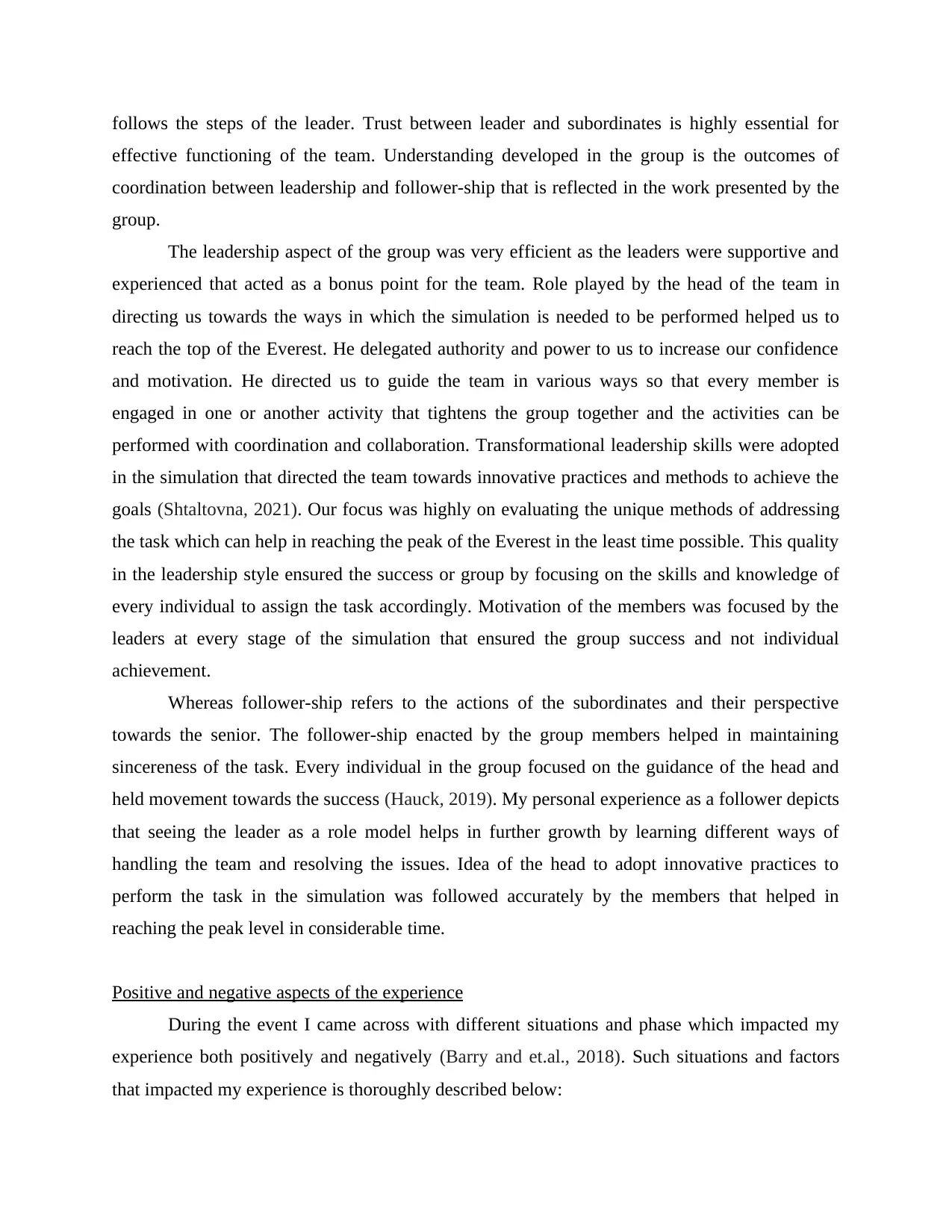
follows the steps of the leader. Trust between leader and subordinates is highly essential for
effective functioning of the team. Understanding developed in the group is the outcomes of
coordination between leadership and follower-ship that is reflected in the work presented by the
group.
The leadership aspect of the group was very efficient as the leaders were supportive and
experienced that acted as a bonus point for the team. Role played by the head of the team in
directing us towards the ways in which the simulation is needed to be performed helped us to
reach the top of the Everest. He delegated authority and power to us to increase our confidence
and motivation. He directed us to guide the team in various ways so that every member is
engaged in one or another activity that tightens the group together and the activities can be
performed with coordination and collaboration. Transformational leadership skills were adopted
in the simulation that directed the team towards innovative practices and methods to achieve the
goals (Shtaltovna, 2021). Our focus was highly on evaluating the unique methods of addressing
the task which can help in reaching the peak of the Everest in the least time possible. This quality
in the leadership style ensured the success or group by focusing on the skills and knowledge of
every individual to assign the task accordingly. Motivation of the members was focused by the
leaders at every stage of the simulation that ensured the group success and not individual
achievement.
Whereas follower-ship refers to the actions of the subordinates and their perspective
towards the senior. The follower-ship enacted by the group members helped in maintaining
sincereness of the task. Every individual in the group focused on the guidance of the head and
held movement towards the success (Hauck, 2019). My personal experience as a follower depicts
that seeing the leader as a role model helps in further growth by learning different ways of
handling the team and resolving the issues. Idea of the head to adopt innovative practices to
perform the task in the simulation was followed accurately by the members that helped in
reaching the peak level in considerable time.
Positive and negative aspects of the experience
During the event I came across with different situations and phase which impacted my
experience both positively and negatively (Barry and et.al., 2018). Such situations and factors
that impacted my experience is thoroughly described below:
effective functioning of the team. Understanding developed in the group is the outcomes of
coordination between leadership and follower-ship that is reflected in the work presented by the
group.
The leadership aspect of the group was very efficient as the leaders were supportive and
experienced that acted as a bonus point for the team. Role played by the head of the team in
directing us towards the ways in which the simulation is needed to be performed helped us to
reach the top of the Everest. He delegated authority and power to us to increase our confidence
and motivation. He directed us to guide the team in various ways so that every member is
engaged in one or another activity that tightens the group together and the activities can be
performed with coordination and collaboration. Transformational leadership skills were adopted
in the simulation that directed the team towards innovative practices and methods to achieve the
goals (Shtaltovna, 2021). Our focus was highly on evaluating the unique methods of addressing
the task which can help in reaching the peak of the Everest in the least time possible. This quality
in the leadership style ensured the success or group by focusing on the skills and knowledge of
every individual to assign the task accordingly. Motivation of the members was focused by the
leaders at every stage of the simulation that ensured the group success and not individual
achievement.
Whereas follower-ship refers to the actions of the subordinates and their perspective
towards the senior. The follower-ship enacted by the group members helped in maintaining
sincereness of the task. Every individual in the group focused on the guidance of the head and
held movement towards the success (Hauck, 2019). My personal experience as a follower depicts
that seeing the leader as a role model helps in further growth by learning different ways of
handling the team and resolving the issues. Idea of the head to adopt innovative practices to
perform the task in the simulation was followed accurately by the members that helped in
reaching the peak level in considerable time.
Positive and negative aspects of the experience
During the event I came across with different situations and phase which impacted my
experience both positively and negatively (Barry and et.al., 2018). Such situations and factors
that impacted my experience is thoroughly described below:
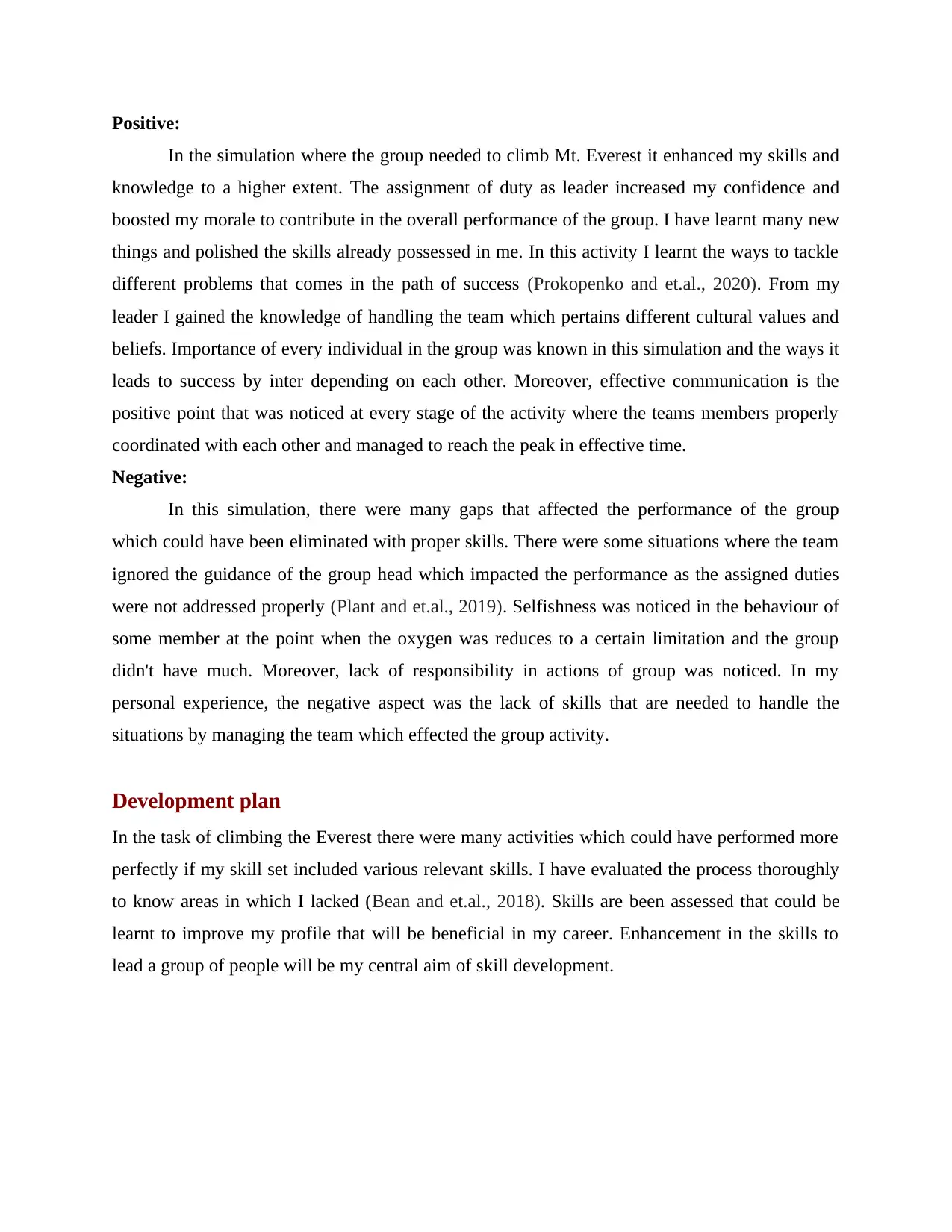
Positive:
In the simulation where the group needed to climb Mt. Everest it enhanced my skills and
knowledge to a higher extent. The assignment of duty as leader increased my confidence and
boosted my morale to contribute in the overall performance of the group. I have learnt many new
things and polished the skills already possessed in me. In this activity I learnt the ways to tackle
different problems that comes in the path of success (Prokopenko and et.al., 2020). From my
leader I gained the knowledge of handling the team which pertains different cultural values and
beliefs. Importance of every individual in the group was known in this simulation and the ways it
leads to success by inter depending on each other. Moreover, effective communication is the
positive point that was noticed at every stage of the activity where the teams members properly
coordinated with each other and managed to reach the peak in effective time.
Negative:
In this simulation, there were many gaps that affected the performance of the group
which could have been eliminated with proper skills. There were some situations where the team
ignored the guidance of the group head which impacted the performance as the assigned duties
were not addressed properly (Plant and et.al., 2019). Selfishness was noticed in the behaviour of
some member at the point when the oxygen was reduces to a certain limitation and the group
didn't have much. Moreover, lack of responsibility in actions of group was noticed. In my
personal experience, the negative aspect was the lack of skills that are needed to handle the
situations by managing the team which effected the group activity.
Development plan
In the task of climbing the Everest there were many activities which could have performed more
perfectly if my skill set included various relevant skills. I have evaluated the process thoroughly
to know areas in which I lacked (Bean and et.al., 2018). Skills are been assessed that could be
learnt to improve my profile that will be beneficial in my career. Enhancement in the skills to
lead a group of people will be my central aim of skill development.
In the simulation where the group needed to climb Mt. Everest it enhanced my skills and
knowledge to a higher extent. The assignment of duty as leader increased my confidence and
boosted my morale to contribute in the overall performance of the group. I have learnt many new
things and polished the skills already possessed in me. In this activity I learnt the ways to tackle
different problems that comes in the path of success (Prokopenko and et.al., 2020). From my
leader I gained the knowledge of handling the team which pertains different cultural values and
beliefs. Importance of every individual in the group was known in this simulation and the ways it
leads to success by inter depending on each other. Moreover, effective communication is the
positive point that was noticed at every stage of the activity where the teams members properly
coordinated with each other and managed to reach the peak in effective time.
Negative:
In this simulation, there were many gaps that affected the performance of the group
which could have been eliminated with proper skills. There were some situations where the team
ignored the guidance of the group head which impacted the performance as the assigned duties
were not addressed properly (Plant and et.al., 2019). Selfishness was noticed in the behaviour of
some member at the point when the oxygen was reduces to a certain limitation and the group
didn't have much. Moreover, lack of responsibility in actions of group was noticed. In my
personal experience, the negative aspect was the lack of skills that are needed to handle the
situations by managing the team which effected the group activity.
Development plan
In the task of climbing the Everest there were many activities which could have performed more
perfectly if my skill set included various relevant skills. I have evaluated the process thoroughly
to know areas in which I lacked (Bean and et.al., 2018). Skills are been assessed that could be
learnt to improve my profile that will be beneficial in my career. Enhancement in the skills to
lead a group of people will be my central aim of skill development.
⊘ This is a preview!⊘
Do you want full access?
Subscribe today to unlock all pages.

Trusted by 1+ million students worldwide
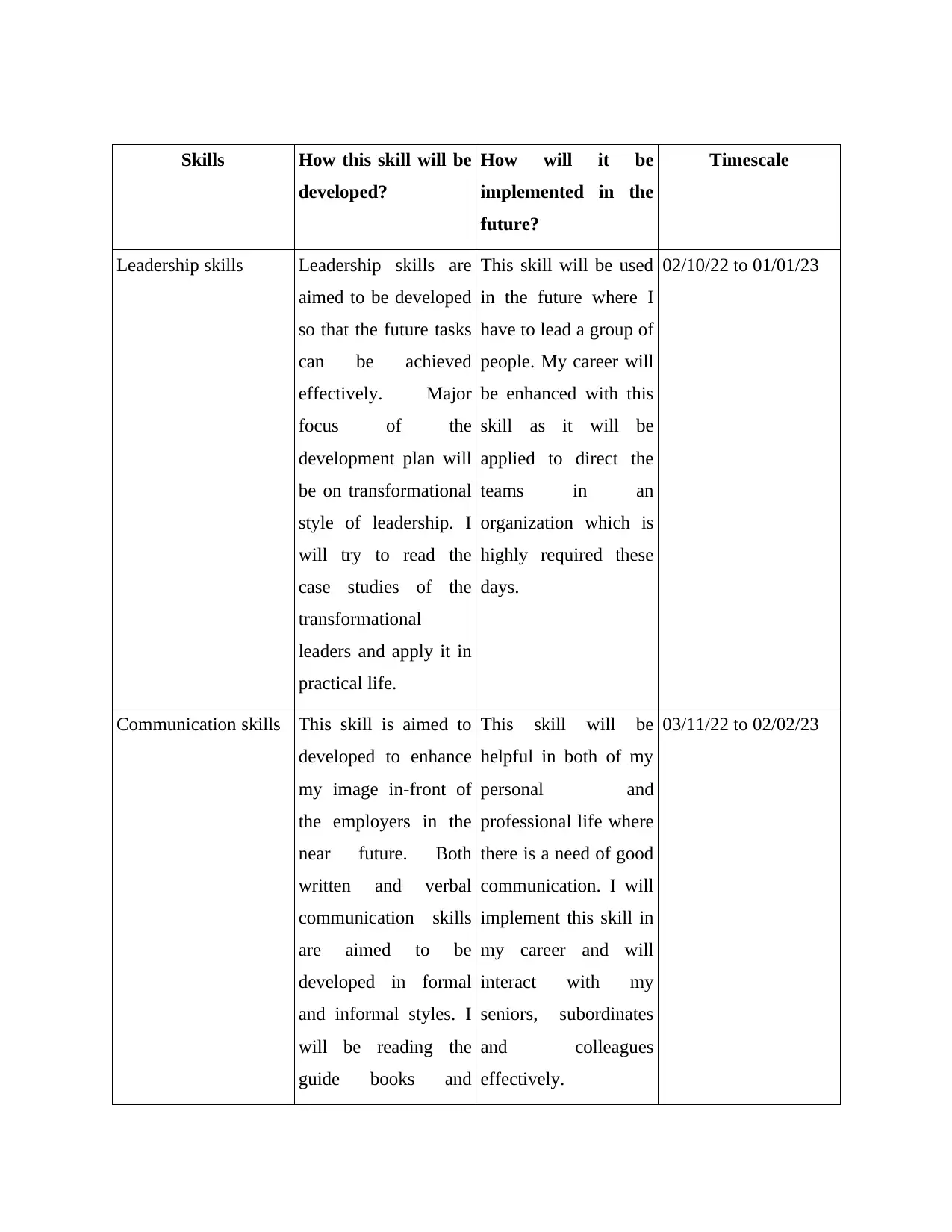
Skills How this skill will be
developed?
How will it be
implemented in the
future?
Timescale
Leadership skills Leadership skills are
aimed to be developed
so that the future tasks
can be achieved
effectively. Major
focus of the
development plan will
be on transformational
style of leadership. I
will try to read the
case studies of the
transformational
leaders and apply it in
practical life.
This skill will be used
in the future where I
have to lead a group of
people. My career will
be enhanced with this
skill as it will be
applied to direct the
teams in an
organization which is
highly required these
days.
02/10/22 to 01/01/23
Communication skills This skill is aimed to
developed to enhance
my image in-front of
the employers in the
near future. Both
written and verbal
communication skills
are aimed to be
developed in formal
and informal styles. I
will be reading the
guide books and
This skill will be
helpful in both of my
personal and
professional life where
there is a need of good
communication. I will
implement this skill in
my career and will
interact with my
seniors, subordinates
and colleagues
effectively.
03/11/22 to 02/02/23
developed?
How will it be
implemented in the
future?
Timescale
Leadership skills Leadership skills are
aimed to be developed
so that the future tasks
can be achieved
effectively. Major
focus of the
development plan will
be on transformational
style of leadership. I
will try to read the
case studies of the
transformational
leaders and apply it in
practical life.
This skill will be used
in the future where I
have to lead a group of
people. My career will
be enhanced with this
skill as it will be
applied to direct the
teams in an
organization which is
highly required these
days.
02/10/22 to 01/01/23
Communication skills This skill is aimed to
developed to enhance
my image in-front of
the employers in the
near future. Both
written and verbal
communication skills
are aimed to be
developed in formal
and informal styles. I
will be reading the
guide books and
This skill will be
helpful in both of my
personal and
professional life where
there is a need of good
communication. I will
implement this skill in
my career and will
interact with my
seniors, subordinates
and colleagues
effectively.
03/11/22 to 02/02/23
Paraphrase This Document
Need a fresh take? Get an instant paraphrase of this document with our AI Paraphraser
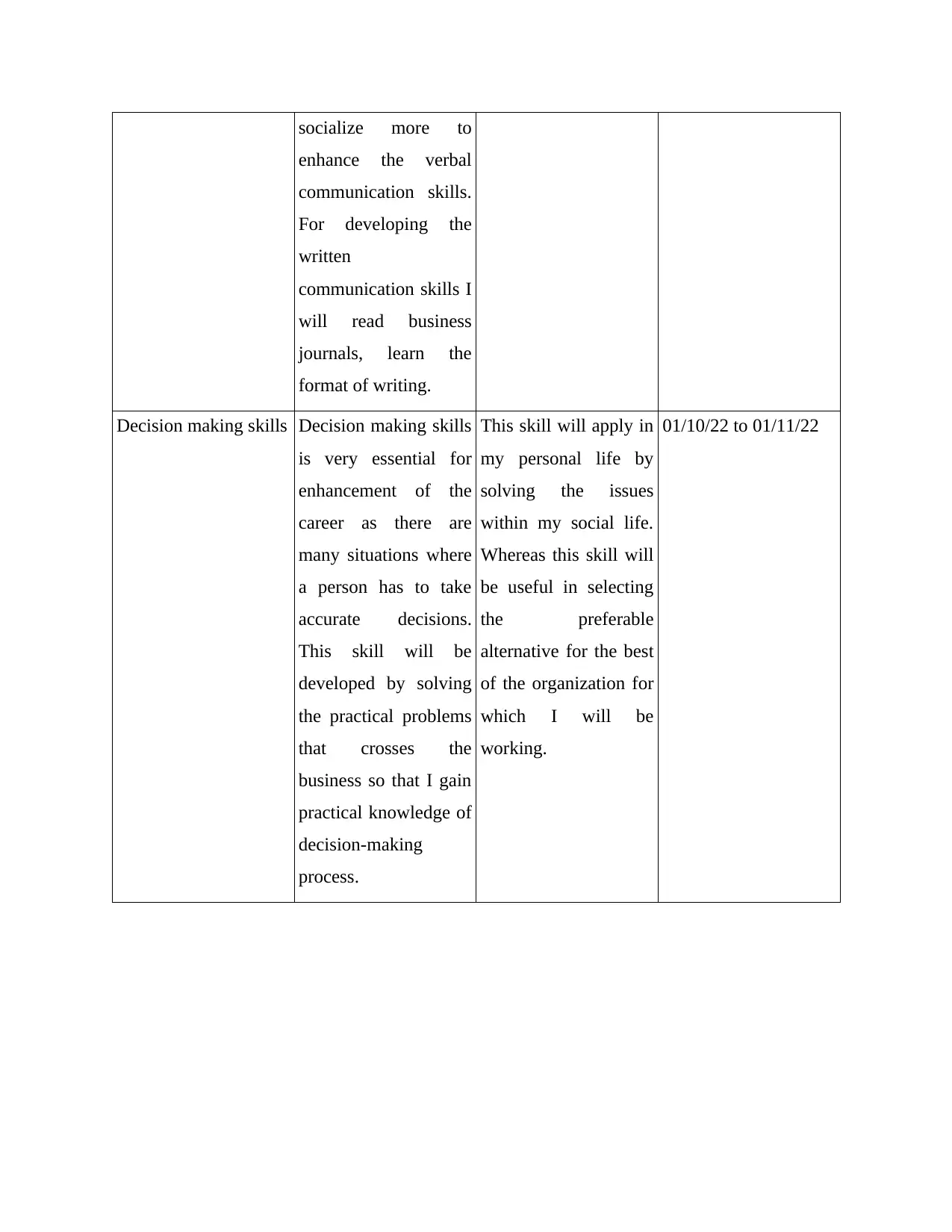
socialize more to
enhance the verbal
communication skills.
For developing the
written
communication skills I
will read business
journals, learn the
format of writing.
Decision making skills Decision making skills
is very essential for
enhancement of the
career as there are
many situations where
a person has to take
accurate decisions.
This skill will be
developed by solving
the practical problems
that crosses the
business so that I gain
practical knowledge of
decision-making
process.
This skill will apply in
my personal life by
solving the issues
within my social life.
Whereas this skill will
be useful in selecting
the preferable
alternative for the best
of the organization for
which I will be
working.
01/10/22 to 01/11/22
enhance the verbal
communication skills.
For developing the
written
communication skills I
will read business
journals, learn the
format of writing.
Decision making skills Decision making skills
is very essential for
enhancement of the
career as there are
many situations where
a person has to take
accurate decisions.
This skill will be
developed by solving
the practical problems
that crosses the
business so that I gain
practical knowledge of
decision-making
process.
This skill will apply in
my personal life by
solving the issues
within my social life.
Whereas this skill will
be useful in selecting
the preferable
alternative for the best
of the organization for
which I will be
working.
01/10/22 to 01/11/22

⊘ This is a preview!⊘
Do you want full access?
Subscribe today to unlock all pages.

Trusted by 1+ million students worldwide
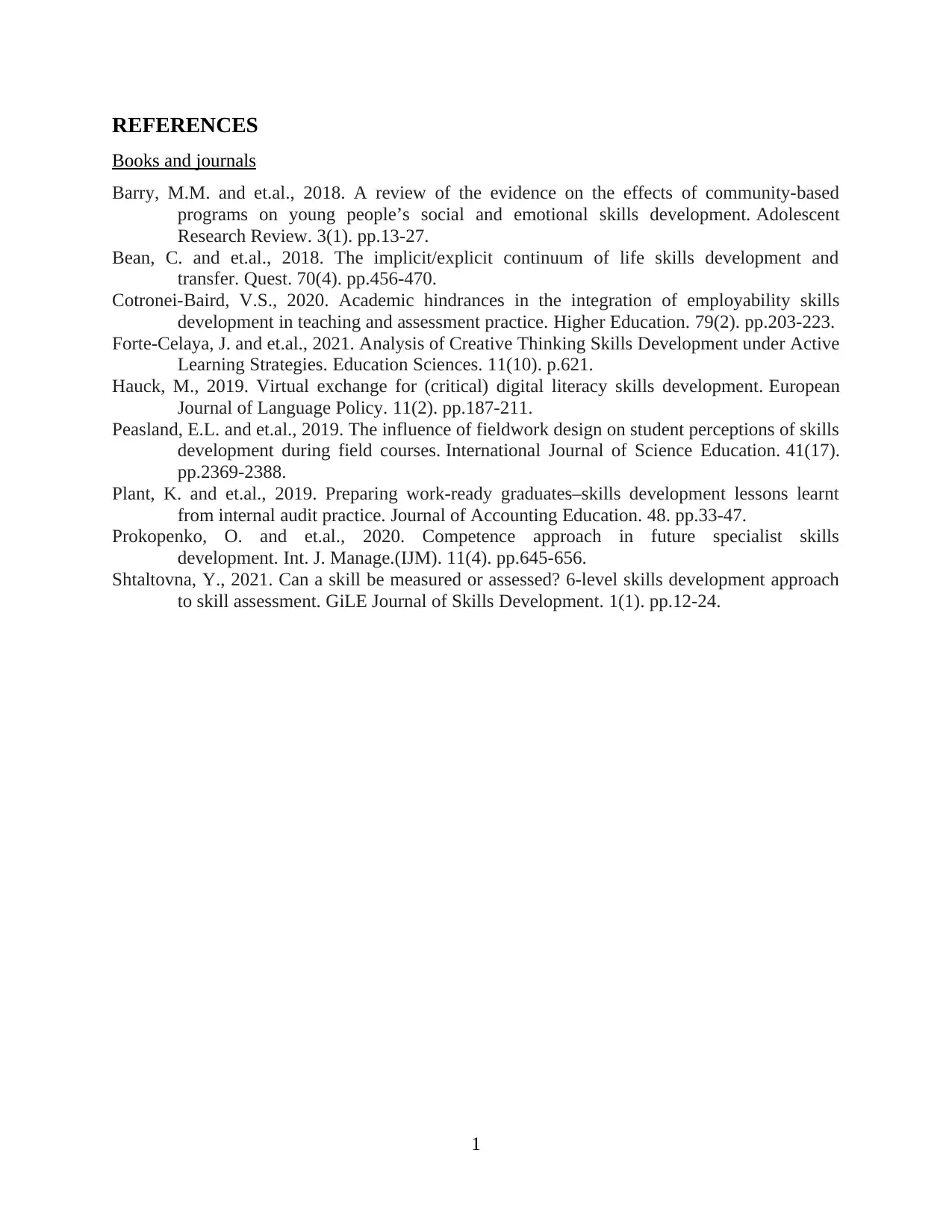
REFERENCES
Books and journals
Barry, M.M. and et.al., 2018. A review of the evidence on the effects of community-based
programs on young people’s social and emotional skills development. Adolescent
Research Review. 3(1). pp.13-27.
Bean, C. and et.al., 2018. The implicit/explicit continuum of life skills development and
transfer. Quest. 70(4). pp.456-470.
Cotronei-Baird, V.S., 2020. Academic hindrances in the integration of employability skills
development in teaching and assessment practice. Higher Education. 79(2). pp.203-223.
Forte-Celaya, J. and et.al., 2021. Analysis of Creative Thinking Skills Development under Active
Learning Strategies. Education Sciences. 11(10). p.621.
Hauck, M., 2019. Virtual exchange for (critical) digital literacy skills development. European
Journal of Language Policy. 11(2). pp.187-211.
Peasland, E.L. and et.al., 2019. The influence of fieldwork design on student perceptions of skills
development during field courses. International Journal of Science Education. 41(17).
pp.2369-2388.
Plant, K. and et.al., 2019. Preparing work-ready graduates–skills development lessons learnt
from internal audit practice. Journal of Accounting Education. 48. pp.33-47.
Prokopenko, O. and et.al., 2020. Competence approach in future specialist skills
development. Int. J. Manage.(IJM). 11(4). pp.645-656.
Shtaltovna, Y., 2021. Can a skill be measured or assessed? 6-level skills development approach
to skill assessment. GiLE Journal of Skills Development. 1(1). pp.12-24.
1
Books and journals
Barry, M.M. and et.al., 2018. A review of the evidence on the effects of community-based
programs on young people’s social and emotional skills development. Adolescent
Research Review. 3(1). pp.13-27.
Bean, C. and et.al., 2018. The implicit/explicit continuum of life skills development and
transfer. Quest. 70(4). pp.456-470.
Cotronei-Baird, V.S., 2020. Academic hindrances in the integration of employability skills
development in teaching and assessment practice. Higher Education. 79(2). pp.203-223.
Forte-Celaya, J. and et.al., 2021. Analysis of Creative Thinking Skills Development under Active
Learning Strategies. Education Sciences. 11(10). p.621.
Hauck, M., 2019. Virtual exchange for (critical) digital literacy skills development. European
Journal of Language Policy. 11(2). pp.187-211.
Peasland, E.L. and et.al., 2019. The influence of fieldwork design on student perceptions of skills
development during field courses. International Journal of Science Education. 41(17).
pp.2369-2388.
Plant, K. and et.al., 2019. Preparing work-ready graduates–skills development lessons learnt
from internal audit practice. Journal of Accounting Education. 48. pp.33-47.
Prokopenko, O. and et.al., 2020. Competence approach in future specialist skills
development. Int. J. Manage.(IJM). 11(4). pp.645-656.
Shtaltovna, Y., 2021. Can a skill be measured or assessed? 6-level skills development approach
to skill assessment. GiLE Journal of Skills Development. 1(1). pp.12-24.
1
1 out of 10
Related Documents
Your All-in-One AI-Powered Toolkit for Academic Success.
+13062052269
info@desklib.com
Available 24*7 on WhatsApp / Email
![[object Object]](/_next/static/media/star-bottom.7253800d.svg)
Unlock your academic potential
Copyright © 2020–2026 A2Z Services. All Rights Reserved. Developed and managed by ZUCOL.





